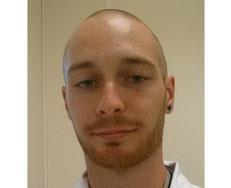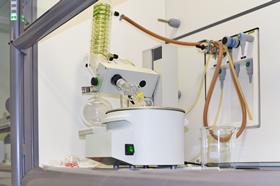Christopher discusses how he combined his love of science and taking things apart and putting them back together
What is a senior analytical systems technician?
My role is a bit like a mechanic but for laboratory equipment. I maintain and fix the equipment when it breaks, and I’m also involved in performance testing the equipment so that everything is working as it should be and giving correct results. I order spare parts and lab consumables, and I am involved in the installation and validation of new equipment. I also set up service contracts with equipment manufacturers, and look after the service engineers while they are on site.
What do you do in your job?
To be honest my role is quite varied. In the morning I check to see if there are any breakdowns that need to be repaired, and fix them if there are. Even after 6 years there are still new faults happening which we have not seen before. If we have new equipment I work on that, writing an SOP (standard operating procedure) which is instructions or a method of how to use a particular piece of equipment. I might arrange for IQ/OQ (installation qualification/operation qualification) where the supplier makes sure the equipment has being installed properly, and does the job it is supposed to do. After this I would carry out a PQ (performance qualification) which is a test to make sure the equipment does the job we want it to do. But each day is different. My work is all laboratory based, and any travel I do would be for training. We do have team building days and company events though which are off site.

What do you enjoy most about your job?
My favourite part of the job is fixing equipment and taking things apart. I really enjoy it when a component in a piece of equipment that I haven’t worked on, or am unfamiliar with, breaks as that means I can take it apart to fix it and learn something new.
What attracted you to becoming a senior analytical systems technician?
I chose my current job because I liked science when I was at school, and I enjoy taking things apart to fix them, before putting them back together. There is also more chance for career progression than my last job, and of course, better pay! I never went to college or university to study any science-related subject. I decided to get a job as soon as I finished school as I didn’t want to get into any debt before getting a job (or at all to be honest). I also think that a lot of industries, not just scientific, value experience just as much, if not more than qualifications.
How did you get into your job?
After leaving school I went to college for a year to do a plumbing course, whilst working part-time in a restaurant kitchen. The plumbing course didn’t go quite as expected so I applied for a job in a local environmental lab working in sample preparation. I worked there for about 18 months preparing soil and water samples to be analysed for contamination, before applying for a job in the Quality Control laboratory of a pharmaceutical manufacturer. I have worked here for 6 years now in a technical support role fixing and maintaining analytical equipment, and have more recently been involved with equipment installations and validation. Last year I applied to become a Registered Science Technician (RSciTech) through the Royal Society of Chemistry. Because I have no A-levels or other qualifications but a lot of experience the RSciTech, as an industry recognised award, demonstrates that I am competent in what I am doing.

What are the opportunities for career progression?
There are lots of different routes that you can take from this type of role. For example, people working in my section have gone on to become Quality Control analysts, while another person recently went on to work for a well-known chromatography software company. Someone has also gone on to become a service engineer for an HPLC manufacturer. Personally at the moment I am still learning new things and enjoying what I am doing so have no plans to move on. In terms of my personal development I have had some on-the-job training and have been sent on a number of courses through work. The courses are generally on specific equipment and software that we use within the laboratory, and are normally provided by the vendor or manufacturer. These have been really helpful, especially because they have all been very specific.
What advice would you give for people wishing to enter your career area?
Nothing out of the ordinary really, just work hard, pay attention, pursue your goals and don’t be afraid to ask questions. Good organisational skills are beneficial when arranging service visits, keeping to schedules and managing workload. It is also good to be mechanically minded, this helps when taking equipment apart, and being logical helps with troubleshooting.
Studying a science subject would have been useful because I would have had a good understanding about chromatography, titrations, and chemistry which is relevant to the pharmaceutical industry, as very little was covered in school. It was by no means essential though as I got the job without any A-levels or degrees, I have learnt a lot on the job about things like instrumentation and relevant chemistry.
First published 2015













